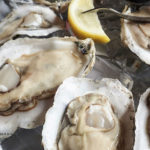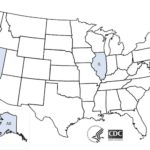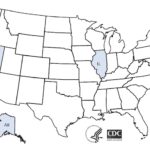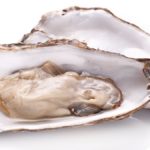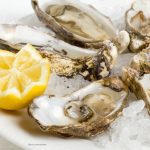With Hurricane Milton poised to hit Florida tomorrow, and people still cleaning up from Helene, there are some things you need to know about flood water. Drowning and building damage are not the only risks from floods. And this water is not just dirty. Flood waters contain chemicals, pollutants, bacteria, toxins, and viruses that can make you sick. And eating food or drinking water contaminated with these waters can be very dangerous. Even containers that you think are sealed are not impervious to flood water. Charlotte County issued a bulletin about these dangers. First, if you are under a boil water notice, use commercially boiled water for mixing baby food formula. Wash your hands with soap and either disinfected or boiled and cooled water, especially before preparing or … [Read more...]
Vibrio Death Investigated in Escambia County, Florida
A Vibrio death is being investigated by public health officials in Escambia County, Florida, according to the Florida Department of Health in that county. Vibrio vulnificus is a bacterium that lives in warm, brackish seawater and it grows faster in the warmer summer months. Shellfish, including oysters, consume the pathogen as they feed on plankton, and it concentrates in the flesh. Anyone who eats a contaminated raw or undercooked oysters can get sick. And anyone with cuts, scratches, or open wounds can be exposed to the pathogen through direct contact with seawater or estuarine water. About 80,000 people are sickened with vibriosis every year, and about 100 people die. While most people who contract this infection only have a mild illness, people in certain populations can … [Read more...]
Avoid Making and Serving These Potentially Dangerous Holiday Foods
Every year people are sickened by certain types of foods. Avoid making and serving these potentially dangerous holiday foods this season. Some are inherently dangerous, and others are easily contaminated with dangerous bacteria. The potentially harmful foods include cannibal sandwiches, raw cookie dough, eggnog, unpasteurized cider, and raw oysters. Cannibal sandwiches are sandwiches made with raw ground beef. They are a specialty in some areas of the Midwest United States. In 2013, an E. coli O157:H7 outbreak in Wisconsin was associated with the seasonal consumption of these sandwiches. Raw ground beef is inherently risky, because cows carry pathogenic STEC bacteria in their guts. When the cows are slaughtered, the bacteria are released and can contaminate the beef. When this beef … [Read more...]
Cooked Butterfly Tail-On Whiteleg Shrimp Recalled For Vibrio
AFC Distribution Corp. of Rancho Dominguez, California is voluntarily recalling Cooked Butterfly Tail-On Whiteleg Shrimp (Sushi Ebi) because may be contaminated with Vibrio parahaemolyticus. Vibrio parahaemolyticus is a bacteria that can cause illness such as vomiting, nausea, diarrhea, fever, and chills. No illnesses have been confirmed to date with the company. This product was sold to designated retail AFC sushi counters, where it was made into different sushi items in grocery stores, cafeterias, and corporate dining centers in these states: Alaska, Alabama, Arkansas, Arizona, California, Colorado, Connecticut, Florida, Georgia, Iowa, Illinois, Indiana, Kansas, Kentucky, Louisiana, Massachusetts, Maryland, Michigan, Minnesota, Missouri, Montana, North Carolina, North Dakota, … [Read more...]
Shigella, Vibrio, E. coli Outbreak Linked to Raw Oysters Ends With 16 Sick
The Shigella, Vibrio, and E. coli outbreak that is linked to raw oysters harvested from Estero El Cardon estuary in Baja California Sur, Mexico, has ended after sickening 16 people, according to the Centers for Disease Control and Prevention (CDC). Two people were hospitalized because they were so sick. The case count by state is: Alaska (1), California (12), Illinois (1), New Hampshire (1), and Nevada (1). Illness onset dates ranged from December 16, 2018 through April 17, 2019. The patient age range was from 26 to 80 years. State public health officials found more illnesses among people who also ate raw oysters from the same harvest area. The FDA investigated a subset of the illnesses investigated by the CDC. Those five patients were sickened with Shigella … [Read more...]
Raw Oysters Sold by DiCarlo Seafood Linked to Outbreak Recalled
Raw oysters that are linked to a multistate, multi pathogen food poisoning outbreak have been recalled, according to the California Department of Public Health. The recalling firm is DiCarlo Seafood of Wilmington, California. At least 16 people who live in 5 states are sick in this outbreak. The pathogens involved are Shigella, Vibrio, E. coli, Campylobacter, and norovirus. Some of the patients are sick with more than one pathogen. Two people have been hospitalized because their illness is so severe. The patients live in Alaska, California, Illinois, New Hampshire, and Nevada. The DiCarlo Seafood imported raw oysters were harvested from Estero El Cardon in Baja California Sur, Mexico. They were sold at restaurants in California. We know they were sold at Fish Market Restaurant at … [Read more...]
Oysters From Mexico Linked to Multistate Shigella Vibrio Outbreak
Oysters from Mexico are linked to a multistate Shigella, Vibrio, E. coli, Campylobacter, and norovirus outbreak, according to the Centers for Disease Control and Prevention (CDC). Some patients were sickened with more than one pathogen. This outbreak was reported by the California Department of Public Health on May 7, 2019; all of the patients at that time lived in California. Now 16 people from five states are ill in this outbreak. Two people have been hospitalized because they are so sick. No deaths have been reported. One recall, by DiCarlo Seafood in Wilmington, California, has been issued. The case count by state is: Alaska (1), California (12), Illinois (1), New Hampshire (1), and Nevada (1). Illness onset dates range from December 16, 2018 to April 4, 2019. The patient age … [Read more...]
Learn About Raw Oysters and Vibriosis
Raw oysters are usually consumed in the summer months. But that particular type of seafood is linked to a disease called vibriosis that can make you very sick. Vibrio bacteria grow naturally in salt water. The three main strains of disease-causing vibrio bacteria are Vibrio parahaemolyticus, Vibrio vulnificus, and Vibrio alginolyticus. About 80,000 people are sickened by vibrio bacteria every year, and 100 people die. Most of these infections occur during the summer months when the water is warmer. But global warming is increasing the growth of this pathogen and others, as the ocean waters warm. That is one reason why we are seeing vibrio outbreaks in Canadian oysters. It's important to know that, as with other pathogenic bacteria, vibrio does not change the taste, texture, smell, … [Read more...]
Climate Change Increasing the Contamination of Vibrio Bacteria in Oysters
Climate change is increasing the number of pathogens in oysters, according to a study published in the National Academy of Sciences. The bacteria Vibrio parahaemolyticus and vulnificus occur naturally in the ocean. Their numbers increase when the water temperatures increase. And oysters, since they are filter feeders, take up these bacteria. When the oysters are eaten raw, people get sick. There have been been many harvesting warnings and recalls of oysters for these pathogenic bacteria in the past few years. And in 2013, there was a Vibrio outbreak associated with raw oysters that sickened at least 104 people in 13 states. Most of these illnesses occur during May to October in the United States, when people eat raw oysters. The bacteria reproduce quickly when the water is … [Read more...]
How to Handle, Cook, and Safely Store Shellfish
The Washington State Department of Heath has posted information about how to safely handle, store, and cook shellfish. There have been Vibrio and norovirus outbreaks linked to eating uncooked shellfish, especially oysters, this year. All fresh shellfish should be stored in an open container in the fridge. Put a damp towel on the container to maintain humidity. Do not store shellfish in water, since they will die and may spoil. Shellfish that open and don't close when they are tapped are dead; do not cook or eat them. If the shells of horse clams, soft-shell clams, geoducks, and razor clams don't completely close, you can store them for three of four days. Shellfish that close their shells completely can be stored up to seven days. That includes oysters, littlenecks, butter clams, … [Read more...]

